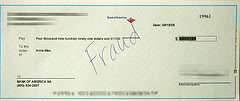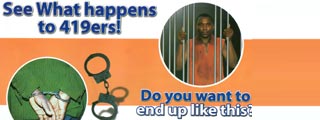The intent behind this is to get people to cash a bogus check and send the money back to them before your bank, or financial institution of choice, realizes the item is NO GOOD!
Most of the time they prefer you wire them the money so it has disappeared into thin air when the criminal aspect is discovered. Once the money is picked up -- especially via Western Union or MoneyGram -- the sender has little to no recourse.
The intended victim is lured into cashing the check and (normally) wiring the money with a promise that there is a LOT more MONEY (please) on it's way. Of course, more money never arrives and the person cashing the check ends up being held liable. Please note, there are stories circulating about people getting arrested for cashing countefeit financial instruments, also.
From the press release on the California Lottery site:
While eyes are watching to see if someone is lucky enough to capture the $270 million MEGA Millions jackpot tomorrow, California Lottery officials warn of a scam arriving in some mailboxes.
The letter from LOTTO LINE claims the recipient has won USA MEGA MILLIONS and includes a check to be cashed and used to pay administrative fees. The check may look authentic, California Lottery officials say, but beware that if it looks too good to be true, it probably is.
Apparently, this isn't the first (or probably the last) time the California Lottery has been impersonated. Here are the previous alerts, I found on the site about this:
CA Lottery Africa Scam
Lottery Logo Scam
Good Samaritan Lottery Scam
MEGA Millions Mail Scam Fradulent Check Scam
International Lottery Scheme Email Scam
Lottery scams are not the only scams involving bogus financial instruments. Counterfeit checks and other bogus financial instruments are sent to the "unwary" all the time. Known bogus items in circulation are Postal Money Orders, Travelers Express (MoneyGram) Money Orders, American Express Gift Cheques and Visa Travelers Cheques.
A great place to learn about these scams is FakeChecks.org.
The FraudAid people (Annie and team) have an excellent page on their site about lottery scams, also.
Full alert from the California lottery, here.




